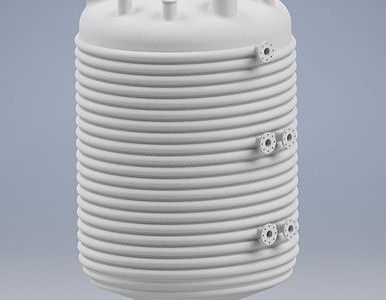"Arg" specific glass for high performance against chemical attacks
03 August 2017
"Arg" specific glass for high performance against chemical attacks

Doubled resistance to abrasion, increased performance against chemical attacks.
Pfaudler ARG is the short name for “Abrasion Resistant Glass”. It is a specific enhancement of the white glass WWG 912, well-known by Pfaudler customers, which has proven its worth for many decades.
Its development was motivated by an increasing demand of the market for comparable chemical properties like the well-known Pfaudler glass types, with a considerably higher impact resistance and especially a higher abrasion resistance compared with the existing proven glass linings.
This desire was fulfilled by the development of ARG.
For this new glass, a new combination of glass and mineral additives was developed, which resulted in an overall improved property profile of glass-lined devices and built-in parts.
This specific combination provides for an increase in abrasion resistance by more than 50% (more than doubled) compared to the standard WWG 911 glass.
To explain this value in detail:
In the internal abrasion test used by Pfaudler, a glass-lined plate is exposed to the impact of chromium-steel balls for one hour in a device rotating at high speed. To further increase the abrasive attack, corundum powder is added during the test runs. This test is repeated several times to not only damage the surface itself, but to measure the wear resistance of the glass layer in its depth.
The chemical resistance to acids and alkalis is determined by standardized ISO corrosion tests. In this case the goal was to achieve at least the same properties as the Pfaudler WWG glass.
The final result was a glass recipe which not only offers improved mechanical properties, but is also characterised by improved chemical resistance. While the resistance to acids was kept constant, resistance to alkalis was increased by 30% compared to the standard WWG glass.
All of the tests performed show that ARG by far exceeds all features to be complied with by technical glass specifications, which are defined in standards ISO 28721-2 and ISO 28721-3. The industrial experience of Pfaudler with ARG has now been successful for more than 7 years.
Additional properties not called for by the standard include the electrical property of a glass which is routinely measured for Pfaudler glass in order to specify its suitability also for non-aqueous products. The Pfaudler internal requirement is that the dielectric strength of a glass layer with a thickness of max. 0.6 mm on test plates must exceed 30 kV/mm at least. That means that for glass-lined products with a minimum layer thickness of 1.0 mm manufactured according to the ISO standards this value is always above 50 kV/mm at room temperature, obviously too high to be determined for the layer thickness required in ISO 28721-1, which is used as a quality standard for normal glass linings.
Conclusion:
The ARG enamel (Abrasion Resistant Glass) combines improved chemical resistivity in alkaline solutions with a significantly higher abrasion resistance compared to the standard of WWG. In the meantime, many industrial reactors are running in processes which are either used for dissolving milled, natural raw materials to gain technical grade commodities or are used as crystallizers for highly purified materials. The operating experience of customers has shown that a reactor lined with ARG surpasses, in practice, the properties measured in the laboratory. According to testimonials, the current service life of ARG coated systems is significantly higher and actually more than doubled in relation to with the previous types of enamels used until then.
At the moment, Pfaudler is the only one in the market to offer a product with similar properties, especially with such highly increased resistance to abrasion without reducing its resistance to chemical corrosion.
Download the document with more technical details
Contact Pfaudler today to learn more









